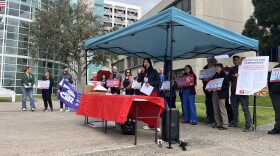D.J. and Angela Ross were not supposed to end up together, according to their families.
"Actually my grandma on both sides used to tell me, 'Boy, you better leave those white girls alone or else we're going to come find you hanging from a tree,' " says D.J., 35, who is black and grew up in southern Virginia.
Angela, 40, who is white and was also raised in Virginia, remembers being warned: "You can have friends with black people, and that's fine. But don't ever marry a black man."
But on Valentine's Day 2008, Angela tied the knot with D.J. in their home state. More than 50 years ago, their marriage would have broken a Virginia law. Designed to "preserve racial integrity," it allowed a white person to only marry people who had "no trace whatsoever of any blood other than Caucasian" or who fell under what was known as the "Pocahontas Exception" for having "one-sixteenth or less of the blood of the American Indian" and "no other non-Caucasic blood."
Virginia wasn't always for all lovers
In 1958, Richard and Mildred Loving were thrown in jail and later banished from Virginia for breaking that law. He was white, and she once described herself as "part negro and part indian."
After receiving a marriage license in Washington, D.C., the Lovings returned home to Central Point, Va., where weeks later, police burst into their bedroom late one night to arrest them. That ultimately led to a legal battle against Virginia's anti-miscegenation law that went all the way to the U.S. Supreme Court almost a decade later.
"This period was a very dangerous period. You didn't want publicity for them, still living in the South," says Philip Hirschkop, one of the lawyers with the American Civil Liberties Union who argued the Lovings' case before the Supreme Court. "President Kennedy was assassinated. Medgar Evers was assassinated. The girls were killed in the church in Alabama. These were very tough, difficult times."
Still, on June 12, 1967, the Supreme Court ruled unanimously in favor of the Lovings, striking down laws banning mixed-race marriages in sixteen states, including Virginia. Chief Justice Earl Warren wrote in the opinion that "the freedom to marry, or not marry, a person of another race resides with the individual, and cannot be infringed by the State."
For the Lovings, the ruling meant they could finally live openly as husband and wife in Virginia with their three children. "Society righted the wrong to some extent," Hirschkop says. "But no one ever paid them for the horrible years they had to spend in terrible fear."
Fifty years after the landmark Supreme Court decision, though, the story of the Lovings resonates with interracial couples in Virginia like D.J. and Angela Ross.
"It's true that we can be together in the open. But some things, I don't think we've made much progress," D.J. says. "Discrimination still happens."
Angela says whenever she and her husband are in public with their five children, she often sees other people shaking their heads.
"Someone may look at me who disagrees with my choice in marrying my husband. I can't take that on," she says. "I can't take on their opinion of me because I know my value and self-worth."
Interracial marriage since Loving v. Virginia
Opinions about interracial marriages have shifted dramatically since the Loving ruling. While adults ages 65 and older and those with a high school diploma or less education are more likely to oppose having a close relative marrying someone of a different race, Americans overall are more open to the idea, according to a recent Pew Research Center report.
The share of newlyweds in interracial marriages has grown sharply. Overall, one out of every six newlyweds today is married to someone of a different race. While Asian and Latino newlyweds are the most likely to marry outside of their racial groups, there have been rapid increases in the share of black and white newlyweds with spouses of different races since 1980.
As they head towards their 10th wedding anniversary next year, Angela and D.J. Ross say they're focused on providing a safe home for their family among the rolling, green hills outside of Roanoke, Va. Angela homeschools their two youngest daughters, Marianna and Jordis, in their garden and living room, where the windows overlook cows and horses grazing on farmland.
D.J. says he's at peace out here with his family.
"As soon as I get here, it's like everything is just gone. You don't have to worry about people looking at me differently, because I'm home," he adds. "It's just us here."
Copyright 2017 NPR. To see more, visit http://www.npr.org/.






